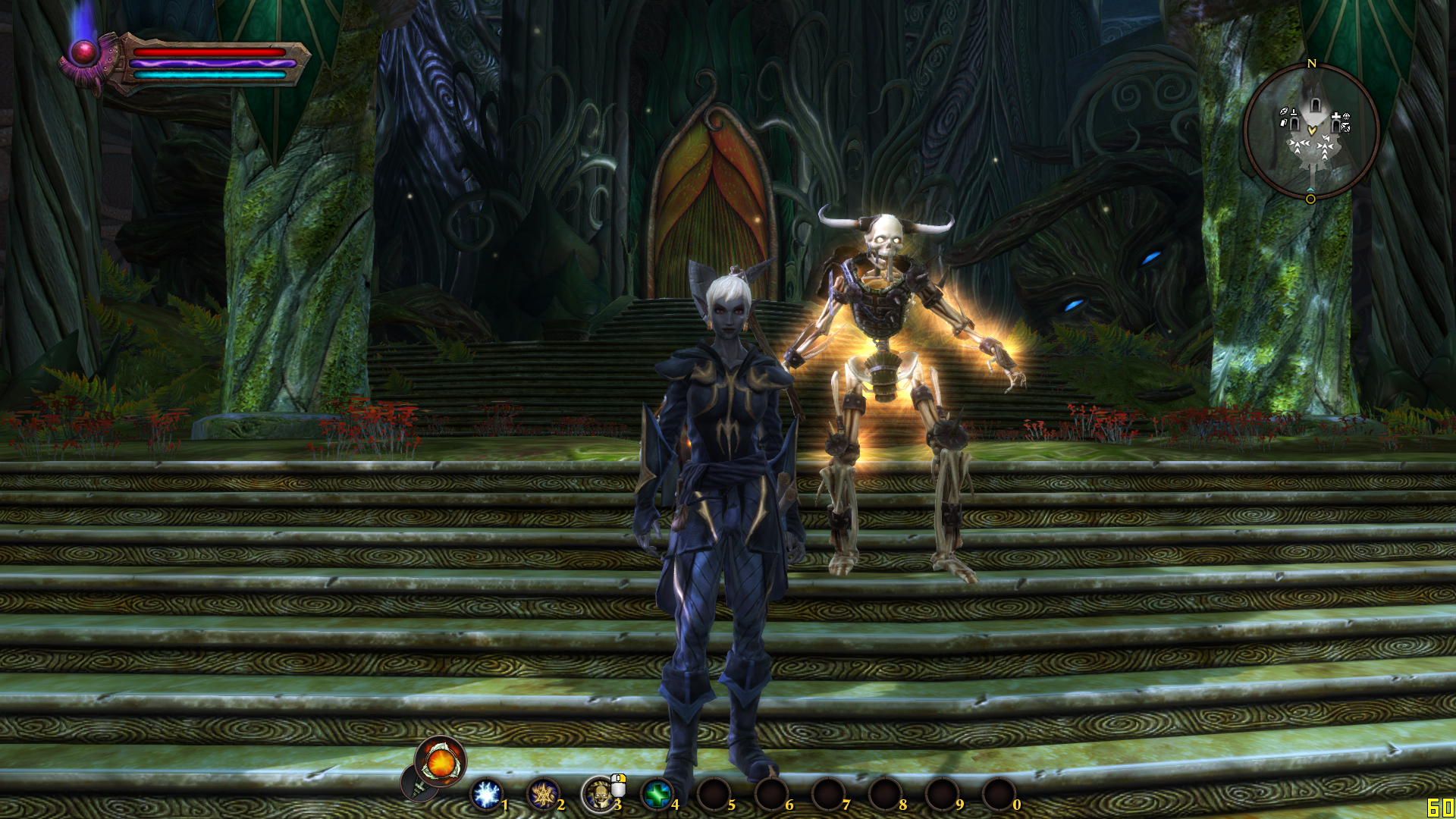Yesterday, “Kingdoms of Amalur: The Re-Reckoning”, an update of 2012’s “Kingdoms of Amalur: The Reckoning” was released. It’s a refresh of a game that seemed groundbreaking at the time, being a single-player experience that would familiarize its players with the world of the MMO at that time known as Project Copernicus.
The story of Project Copernicus and its developers, 38 Studios, would fill books. Its failure left Kingdoms of Amalur in a weird spot: An MMO-ish single player RPG set in an MMO world that would never exist. While playing KoA, it’s easy to imagine other people crafting at the quest hubs, teaming up for the dungeons, and bringing the world to life. As a single player game, it plays like an MMO just after the servers come up.
There’s a lot of people who like playing MMOs by themselves, after all, and KoA had a certain amount of success.
During the discussion on Twitter about the game yesterday, Raph Koster derided KoA for reducing a MMO into a bunch of kill and fetch quests, when the genre could do much more.
To me the most fascinating thing about this article is the way "MMO-ness" has been reduced down to a series of kill and fetch quest pellets.https://t.co/ZZ0LuhPj9n
— Raph Koster (@raphkoster) September 8, 2020
It doesn't have to be that way, and won't be if I can help it. Alternate worlds are a bigger dream than that.
I absolutely agree that MMOs can offer much more, and all the great ones do. But I think it’s important to remember that MMOs are the way they are — nowadays, quest hubs that provide a focus point for each new area — because that’s what players want.
I didn’t play Meridian 59 or Ultima Online, so I can’t speak to those, but I played a lot of EverQuest.
EverQuest didn’t have quest hubs; it didn’t even really have quests, and those it did have were scattered throughout the world. People would famously wait hours and days for a quest NPC to spawn somewhere far away from any town. It was very organic, but when World of Warcraft consolidated questing to quest hubs, it was instantly popular and from then on, that’s how questing was done. EverQuest II was all about the quest hubs. The developers had learned their lesson.
EverQuest had very little non-group content — exploration and crafting were about the extent of that. World of Warcraft allowed quite a lot of soloing. In Final Fantasy XIV, nearly all content is soloable — in Stormblood, even the dungeons are soloable (you go with a group of NPCs).
Back when I worked at Massively, we had a lot of discussions about just what made an MMORPG, an MMORPG? We would get tons of press releases touting the next new MMO. League of Legends? World of Tanks? Project Powder? According to their developers, all were MMOs.
We distilled MMORPG-ness down to a few rules:
- A persistent, consistent world. This is a virtual world that still exists for other players when you aren’t playing, and is the same for all players. World of Tanks and other lobby-based games are not persistent. Minecraft is persistent, but the world is very different from server to server.
- A unique player avatar. To be an MMO, the game should allow you to create your own avatar that other players will come to associate with you, the player. The explosion of 2D action “MMOs” where you chose your class and therefore your player avatar had the multiplayer part, but not the RPG part.
- The ability to interact with other players — the social aspect. Forming connections among players is probably an MMORPG’s most important feature. That’s the spark that keeps people logging in. It’s why I still play DCUO after all these years.
That’s it. Nothing about levels and stats, nothing about quests, or raids, or dungeons. Second Life is an MMO by these rules. Marvel Avengers is not. Kingdoms of Amalur: Reckoning is not (and never claimed to be), but the aspects that people point to when they talk about its MMO nature, the kill and fetch quests — they aren’t actually a required feature of an MMO.
Those sorts of things come into play because, time and time again, players have demanded those sorts of features, and game developers have chosen to accommodate them. Players want raids, and so there are raids (EverQuest didn’t have raids to start — it had three world bosses, Nagafen, Vox and Phinny, and the players invented raiding in order to take them down).
Now, Raph didn’t say “MMOs”. He said “Alternate worlds”. What makes an alternate world different from an MMORPG is for him to define, but no matter what he comes up with, I guarantee the players are going to demand more direction than “Here is a world, go forth!”. The state of the MMORPG today is the end product of over twenty years of player refinement.
I bought the new remake to Kingdoms of Amalur. I got a discount because I’d bought it on Steam before, so it made sense. It’s been about five years since I last played it, according to YouTube, so the time is right for a replay, once I finish Banner of the Maid.




I made a conscious decision several years ago not to use the terms “MMO” and “MMORPG” interchangeably. To me, MMO simply means any kind of game that a large number of players play, simultaneously, online. It still begs the question “how large is “large?”, of course. I have an arbitrary figure of “about a hundred” in my mind but I’ve heard people call games that accomodate as few as 20 or 30 players “MMOs”.
I don’t see any reason an MMO would need to have persistence or unique avatars. Since it would always need a lot of players for the MM part you might think it would also need the ability for them to interact but only in the most nominal fashion, as in they’d all have to be doing something in the same gamespace at the same time. There’d be no requirement for them to be able to communicate with each other, though. A war game in which every match began with a new map and all players were allocated pre-designed playing pieces would be an MMO.
To be an RPG, though, there has to be persistence of character at the very least. And progression of character, too. Without those you don’t have what we generally understand as an RPG in video game terms. I guess if you were to take the RP aspect at its base value, you could conceivably just have an online space in which people could interact and pretend to be imaginary characters and call that an RPG but that seems to me to be too loose. It would encompass all chat rooms and basically be “the internet”.
When I’m being really precise, I always try to use the term “Diku-MUD MMORPG” because that’s really the sub-genre that interests me. EQ was the ur-example of that and WoW is the biggest and best known. I guess by osmosis we could shorthand it too “WoWalikes” now.
Anyway, this has been hashed over ten million times, not least by me. I’m not sure it ever goes anywhere because, like all definitions, it relies entirely on consensus. And if we had that, we wouldn’t need to talk about it.
Point noted — my main point here (and of course I MUD-died it up) was that most of the features we value in current MMOs are the ones the players demanded.
I guess it doesn’t make much sense to try and define MMOs, mostly because I’m sure there’s a lot of “I know it when I see it” going on. But I feel it does help group things in a useful way. Tomorrow, I’m probably going to discuss if DCUO is an MMO…
I have been thinking a lot about part of what I think you were trying to get at, which is what do we want out of these types of games? What got me thinking about it was an anime that’s on Netflix right now, Sword Art Online (and the spin off show Gun Gale Online). The MMORPGs depicted there make for a fascinating TV show. But I’m not sure I would find the games depicted all that fun. They look a bit unfocused. Kind of like launch era EQ mashed up with PUBG (and maybe a bit of UO or EVE for good measure). Probably the closest thing to them I’ve played was SWG, and it was kind of boring. “Here are a bunch of systems, now make your own fun” just isn’t all that great of a game design to my tastes.
Is the multiverse from Ready Player One the ultimate design goal that we should attain to? If so, why didn’t Free Realms do better? It was a similar design, if on a much smaller scale. However GTA online is going really well, and it’s also similar in some ways (tons of different games mashed together in one virtual playground). If GTAO let you have thousands of players in spaces that were truly persistent (and maybe had more RPG mechanics), would it be the ultimate MMORPG?
A lot of similar questions have been swirling around my noggin, and I haven’t come up with answers I find satisfying yet.